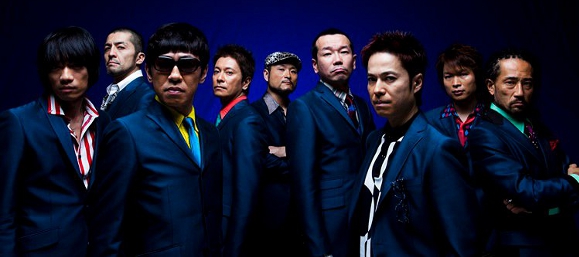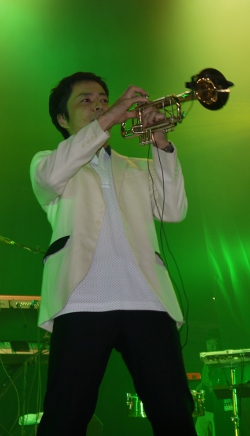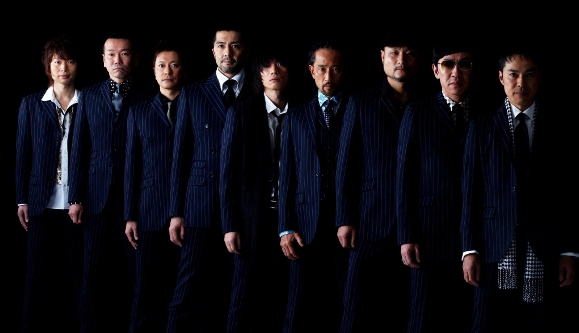Articles about reggae music, reviews, interviews, reports and more...
Interview: Tokyo Ska Paradise Orchestra
- Home
- Articles
- Interviews
- Interview: Tokyo Ska Paradise Orchestra

Interview: Tokyo Ska Paradise Orchestra
"Ska music is easy to fuse with a lot of other kinds of music"
Sampler
A dynamic blend of ska, jazz, rock and punk elements, Tokyo Ska Paradise Orchestra are an institution in their native Japan. Formed in the late 1980s, they were a ground-breaking act that achieved an almost immediate success, and went on to collaborate with numerous vocalists in the pop world, all the while rising ska’s profile in the Far East. Ten years ago, a contract with a small German label helped bring them to the attention of Western audiences; presently they are continuing the journey with considerable aplomb, furthering their vivid experimentation while exploring the outer limits of ska.

At this year’s WOMAD, the annual weekend-long World of Music, Art and Dance festival held by Peter Gabriel in the British countryside in July, the group was one of the high-energy highlights, their hugely likeable blend of styles delivered at a fast pace with plenty of on-stage showmanship.
After the well-received performance, which took place on Friday afternoon in the Siam tent, baritone saxophonist Atsushi Yanaka and guitarist Takashi Kato were kind enough to talk to me about the evolution of their sound.
I’d like to start with a general question about the origins of this band. I know you’ve been going for a very long time. Can you take us back to the beginning? How did the band start, when, and why?
AY: 23 years ago, we met at Tokyo city, we knew ska music at a record shop. There was no internet.
Was it one record shop in particular?
AY: Today that is closed. It was called Wave.
TK: Tokyo has a hard, cutting-edge club music scene. Ska music is not so popular, but one of the cutting-edge musicians collected from Jamaica early 60s ska music. We hope, we try to make the ska music more popular in Japan, make it growing up, a music for the general music fans. We try to do that.
AY: Oh, I just remembered something: Gaz Mayall is very important to us. We knew ska music by his cassette tapes. He sold them at Waves. It was magic ska, cassette tapes! One member bought a tape and he was crazy about that. Then we were influenced by that. Gaz Mayall was very important. I love him!
 Gaz Mayall is very important to us. We knew ska music by his cassette tapes
Gaz Mayall is very important to us. We knew ska music by his cassette tapes
You are known for frequently collaborating with prominent vocalists.
AY: Yes, we have been featuring so many vocalists, famous Japanese vocalists, so many vocalists, and now, from America, Angelo Moore from Fishbone, and from Spain, Manu Chao. You can listen to Manu Chau on our song, the song is on the homepage of Manu Chao, the song’s name is ‘Let Me Come The River Flow’. I wrote the lyrics with him.
What about some of the Japanese vocalists you collaborated with? They come from different styles of music, they’re not coming from ska, or the club scene. How did they feel about collaborating with you?
 TK: Maybe the Japanese music fans see us not only as a ska music band, but as general popular music. We often collaborate with famous Japanese vocalists. We played TV shows for 20 years, so…
TK: Maybe the Japanese music fans see us not only as a ska music band, but as general popular music. We often collaborate with famous Japanese vocalists. We played TV shows for 20 years, so…
AY: Most famous vocalists from Japan know us. So, it is easy.
When you first put the band together, how were you received by the public?
AY: They felt very strange! Because we were wearing suits, and so many people in the horn section.
TK: About one year later, after we started our debut, about 10,000 people come to our shows, after only one year. A very particular sound and style, so it looks like a cutting-edge band.
At that time, was anyone else in Japan doing this kind of hybrid of ska and rock and jazz?
TK: I don’t think so. Ska music is easy to fuse with a lot of other kinds of music, I think. So we try to do it with sometimes jazz music, sometimes popular music, sometimes like ‘world music.’
AY: And we can play at rock festivals and jazz festivals, and reggae festivals. It is a very useful music for us, and we love ska.
You’ve had many personnel changes over the years. It was suggested that some years after you formed, the band’s style was a bit more commercial, or less experimental. What is your view of the band’s evolution?
TK: I feel, myself, recently, music needs an entertainment part, so we’re trying to entertain. Not only be experimental. So many listeners can enjoy our music by Youtube or something like that, by seeing a music video…so I’m thinking about how we can make an approach to the audience visually.
AY: I think, 20 years ago, other members were younger, and we are getting older now, and I think 20 years ago, young men, they can play some music to express their anger, and now, we our message is more like, ‘All good ska will unite us together.’ It’s our ska music. It’s getting better, the reason why we play for the people all over the world, I think. It’s changing.
 20 years ago, young men, they can play some music to express their anger, and now, we our message is more like, 'All good ska will unite us together'
20 years ago, young men, they can play some music to express their anger, and now, we our message is more like, 'All good ska will unite us together'
TK: I think punk music’s energy is anger, was anger, and we use the punk music’s anger, or something…we recycle it into clean energy now.
You draw from the anger of punk, but turn it into a positive energy?
TK: Yes! Exactly!
The first time I became aware of the band was when you had an album released in Germany, Full Tension Beaters. How did that record come about, and what was the band like at that time?
AY: Full Tension Beaters, that was ten years ago, in Germany. Ten years ago, we started touring in Europe, there were many, many core fans. We had never come to Europe to play before, so Grover Records was a small label in Germany that wanted to release our albums, that’s how it happened. We were searching for a good label for Europe. Ten years ago, we were trying to make our music spread, more and more in Europe, so we tried to play in summer festivals around Europe, so we were searching for a good label in Germany. And our latest album may be released this summer on Manu Chau’s label.
What is your new album going to be called?
TK: Walkin’.
AY: It includes a cover of the song ‘Walkin’.
TK: ‘Walkin’ by Miles Davis, with Gene Hammonds.
AY: This album includes Manu Chau, and Angelo Moore.
 There was a big earthquake in Japan, so many concerts were cancelled in Tokyo. I was very down, and then I wrote, 'We can unite, we play ska music'
There was a big earthquake in Japan, so many concerts were cancelled in Tokyo. I was very down, and then I wrote, 'We can unite, we play ska music'
TK: There was a big earthquake in Japan, so after the earthquake, so many concerts were cancelled in Tokyo, so we were very…we lost our hearts. I was very down, and then I wrote, ‘We can unite, we play ska music.’
What else can we expect from you in the future?
AY: Yeah, we’ll be playing around Europe.
TK: Recently we went to Mexico.
AY: Yes, this year.
TK: People were enthusiastic, extremely! We couldn’t hear the sound on the stage because of the crowd.
AY: Yeah, everybody…‘Ah!’ That was at Vive Latino, a very big place in Mexico City. Vive Latino is one of the biggest festivals in Mexico, about 30,000 people. Everybody knows us, but we don’t know why…maybe from the internet. For the Mexican people, the ska music is a very important music, for the young persons. It’s a rebel music, so the younger people were there. And we’ll make a tour this year, in October, in Mexico.
TK: We also went to Guadalajara. We were well known in Mexico.

Have you been to Jamaica yet?
AY: Ah, no!
TK: It must be most interesting! We haven’t been there yet.
AY: In the near future.
TK: It’s ska’s birthplace.
 We are making a new album, so we try to release it for European people
We are making a new album, so we try to release it for European people
What are you working on right now?
AY: Now, we’re recording in Europe. After this show, we’ll start recording a new album in London, maybe our friend, Dennis Bovell, will come. Now, we are making a new album, so we try to release it for European people.
(Thanks to Mamoru Murakami of Avex Entertainment, his translating staff, and to Giles Cooper and Louise Boddily of Borkowski for their assistance).
Comments actually desactivated due to too much spams
Browse by categories
Recommended Articles
Latest articles
Recently addedView all
© 2007-2026 United Reggae. All Rights Reserved. Reproduction in whole or in part is prohibited. Read about copyright
Terms of use | About us | Contact us | Authors | Newsletter | A-Z














